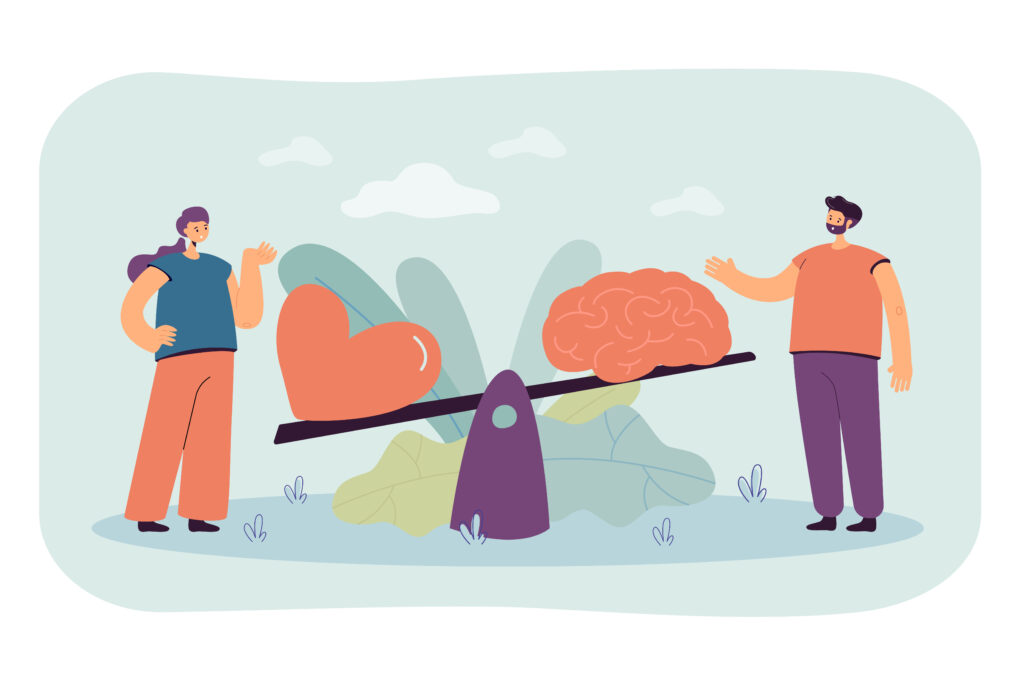
Do not know why are things happening as it’s happening to you? Suffering from stress? Anxiety?
Confused!!! Then you need to check your EI/EQ levels.
EI is a highly valuable trait that can greatly impact one’s personal and professional success.
Students who develop strong EI skills are more likely to handle challenging situations effectively, maintain positive relationships with peers and educators, and achieve their academic goals.
One of the primary benefits of emotional intelligence for students is the ability to manage stress and anxiety. Through EI, students can learn to identify and regulate their emotions, which can help them cope with the challenges and pressures of school.
They can better manage their stress levels, avoid burnout, and improve their overall mental health. This includes being able to recognize their own triggers and reactions to stressful situations and take steps to reduce their impact.
In addition to managing emotions and stress, developing emotional intelligence can also lead to better communication and conflict-resolution skills.
Overall, emotional intelligence is a critical soft skill set for any student looking to succeed academically and personally. Developing these skills can lead to improved stress management, better communication and conflict resolution, and even enhanced leadership abilities.
By investing in improving your EI, you can position yourself for success in both your academic and personal lives.
In this article, we will explore the significance of emotional intelligence for students and discuss how developing these skills can unlock success in various aspects of their lives.
What is emotional intelligence?
The meaning of Emotional intelligence encompasses a range of skills, which includes self-awareness, regulation, empathy, and effective interpersonal skills.
Emotional intelligence refers to the ability to recognize, understand, and manage our own emotions and the emotions of others.
It involves a combination of intrapersonal and interpersonal skills that enable individuals to navigate social interactions, handle challenges, and make informed decisions.
While academic intelligence (IQ) is crucial, emotional intelligence provides students with the tools necessary to excel in relationships, adapt to change, and thrive in diverse environments.
The Components of Emotional Intelligence

Self-awareness
Self-awareness is the foundation of emotional intelligence. It involves recognizing and understanding one’s own emotions, strengths, weaknesses, values, and goals. Students with high self-awareness have a clearer sense of their emotions, which enables them to regulate and express themselves effectively.
Self-regulation
Self-regulation is the ability to manage and control one’s emotions, impulses, and behaviors. It involves staying calm under pressure, controlling anger or frustration, and adapting to changing circumstances. Students who possess self-regulation skills can maintain focus, persevere through challenges, and make thoughtful decisions.
Empathy
Empathy involves recognizing and responding to the emotions and needs of those around us. Students with high levels of empathy are better equipped to build positive relationships, resolve conflicts, and demonstrate compassion towards others.
Social skills
Social skills encompass the ability to communicate effectively, build relationships, collaborate, and work as part of a team. Students who excel in social skills are more likely to engage in healthy and constructive interactions, develop support networks, and succeed in group projects or extracurricular activities.
Importance of emotional intelligence for students

- Improved academic performance: Emotional intelligence is closely linked to academic success. Students with high emotional intelligence are better equipped to manage stress, maintain focus, and regulate their emotions during exams or challenging assignments. They are also more likely to seek help when needed, communicate effectively with teachers, and engage in proactive learning strategies.
- Stronger relationships: Developing emotional intelligence fosters healthier relationships with peers, teachers, and family members. Students who understand their own emotions and those of others can communicate more effectively, resolve conflicts in a constructive manner, and show empathy and understanding. These skills contribute to a positive social environment and can lead to increased support and cooperation from others.
- Enhanced decision-making: Emotional intelligence enables students to make informed and thoughtful decisions. By understanding their own emotions and considering the emotions of others, students can weigh the potential impact of their choices and make decisions that align with their values and goals. This ability is particularly valuable when faced with complex situations that require empathy and critical thinking.
- Improved mental well-being: Emotional intelligence is closely associated with mental well-being. Students who possess emotional intelligence skills are more resilient, able to manage stress effectively, and have a stronger sense of self. They are better equipped to navigate challenges, bounce back from failures, and maintain a positive outlook on life.
How to develop Emotional Intelligence for students
While some individuals may naturally possess higher levels of emotional intelligence, these skills can be improved and enhanced over time. Here are some strategies for students to cultivate emotional intelligence:
- Self-reflection: Encourage students to engage in regular self-reflection to gain a deeper understanding of their emotions, strengths, and areas for growth. Journaling, meditation, and mindfulness exercises can be effective tools for self-reflection.
- Emotional vocabulary: Help students expand their emotional vocabulary by introducing a wide range of emotions and encouraging them to articulate their feelings accurately. This practice enables students to identify and communicate their emotions effectively.
- Active listening: Teach students the importance of active listening and empathetic communication. Encourage them to genuinely listen to others, validate their emotions, and respond with empathy and understanding.
- Conflict resolution: Provide students with opportunities to develop conflict resolution skills. Teach them techniques such as active listening, compromise, and finding common ground. These skills empower students to navigate conflicts constructively and build stronger relationships.
- Role-playing: Engage students in role-playing exercises that simulate real-life situations. This allows them to practice empathy, effective communication, and problem-solving skills in a safe and supportive environment.
Theories of Emotional Intelligence
Several theories have been proposed to explain and understand emotional intelligence (EI). These theories provide frameworks for conceptualizing and measuring different aspects of EI. Here are some prominent theories of emotional intelligence:
- Salovey and Mayer’s Ability Model: Proposed by Peter Salovey and John Mayer, this model defines emotional intelligence as the ability to perceive, understand, and regulate emotions in oneself and others. It consists of four branches: perceiving emotions, using emotions to facilitate thinking, understanding emotions, and managing emotions. According to this model, emotional intelligence is a set of cognitive abilities that can be measured through performance-based tests.
- Goleman’s Mixed Model: Developed by Daniel Goleman, this model emphasizes both cognitive and emotional aspects of intelligence. Goleman’s model includes five components of emotional intelligence: self-awareness, self-regulation, motivation, empathy, and social skills. He argues that these components are crucial for personal and social competence, and that emotional intelligence can be learned and developed throughout life.
- Bar-On’s Model of Emotional-Social Intelligence (ESI): Reuven Bar-On proposed a model that considers emotional intelligence as a set of emotional and social skills that influence overall well-being. Bar-On’s model comprises five main areas: self-perception, self-expression, interpersonal relationships, decision-making, and stress management. He emphasizes the importance of emotional and social competencies for adapting to and coping with life’s challenges.
- Mayer and Salovey’s Four-Branch Model: Building upon their earlier work, Peter Salovey and John Mayer proposed a revised model that highlights four branches of emotional intelligence. These branches include perceiving emotions (recognizing emotions in oneself and others), using emotions to facilitate thinking, understanding emotions, and managing emotions. This model emphasizes the adaptive function of emotions and how they can influence cognitive processes.
- Petrides and Furnham’s Trait Model: Petrides and Furnham’s trait model of emotional intelligence suggests that emotional intelligence can be understood as a personality trait. According to this model, emotional intelligence is related to a person’s ability to perceive, understand, and regulate emotions in themselves and others. It emphasizes that emotional intelligence can be measured through self-report questionnaires and is stable over time.
It is important to note that there is ongoing debate and discussion regarding the nature and measurement of emotional intelligence. These theories provide different perspectives and approaches to understanding emotional intelligence, and researchers continue to explore and refine the concept through empirical studies and further theoretical development.
Emotional Intelligence Questionnaire for Students
Here is a sample emotional intelligence questionnaire for students. This questionnaire aims to assess various components of emotional intelligence, including self-awareness, self-regulation, empathy, and social skills.
It is important to note that this is just a sample questionnaire, and you can modify or adapt it based on your specific needs and the age group of the students.
Instructions: Please read each statement carefully and indicate your level of agreement or disagreement with each statement by selecting the appropriate response.
- I am aware of my emotions and can easily identify what I am feeling.
- a) Strongly Agree b) Agree c) Neutral d) Disagree e) Strongly Disagree
- I can manage my emotions effectively, even in stressful situations.
- a) Strongly Agree b) Agree c) Neutral d) Disagree e) Strongly Disagree
- I can understand how others might be feeling, even if they do not express it openly.
- a) Strongly Agree b) Agree c) Neutral d) Disagree e) Strongly Disagree
- I am able to put myself in someone else’s shoes and understand their perspective.
- a) Strongly Agree b) Agree c) Neutral d) Disagree e) Strongly Disagree
- I am good at resolving conflicts and finding solutions that work for everyone involved.
- a) Strongly Agree b) Agree c) Neutral d) Disagree e) Strongly Disagree
- I am comfortable expressing my emotions and thoughts to others.
- a) Strongly Agree b) Agree c) Neutral d) Disagree e) Strongly Disagree
- I listen attentively when someone is talking to me and try to understand their point of view.
- a) Strongly Agree b) Agree c) Neutral d) Disagree e) Strongly Disagree
- I can stay calm and composed when faced with difficult or challenging situations.
- a) Strongly Agree b) Agree c) Neutral d) Disagree e) Strongly Disagree
- I am good at recognizing and managing my own strengths and weaknesses.
- a) Strongly Agree b) Agree c) Neutral d) Disagree e) Strongly Disagree
- I enjoy working collaboratively with others and can effectively contribute to a team.
- a) Strongly Agree b) Agree c) Neutral d) Disagree e) Strongly Disagree
- I am able to adjust my behavior and adapt to different social situations.
- a) Strongly Agree b) Agree c) Neutral d) Disagree e) Strongly Disagree
- I can handle criticism and feedback positively and use it to improve myself.
- a) Strongly Agree b) Agree c) Neutral d) Disagree e) Strongly Disagree
- I understand the impact of my actions on others and strive to treat people with respect.
- a) Strongly Agree b) Agree c) Neutral d) Disagree e) Strongly Disagree
- I am good at recognizing and managing my stress levels effectively.
- a) Strongly Agree b) Agree c) Neutral d) Disagree e) Strongly Disagree
- I enjoy helping others and am sensitive to their needs and emotions.
- a) Strongly Agree b) Agree c) Neutral d) Disagree e) Strongly Disagree
Scoring: Assign the following values to each response:
Strongly Agree = 5, Agree = 4, Neutral = 3, Disagree = 2, Strongly Disagree = 1.
Calculate the total score by summing up the values for each response. A higher score indicates a higher level of emotional intelligence.
Remember, this questionnaire is a starting point and should be used as a tool to initiate conversations and self-reflection about emotional intelligence.
6 books on emotional intelligence for students
Developing emotional intelligence is a valuable skill for students, and there are several books that can help them understand and cultivate this aspect of their lives. Here are some recommended books on emotional intelligence for students:
- “The Emotional Intelligence Skills Workbook for Teens: Help for Teens & Young Adults” by Michelle Skeen and Matthew McKay
- “The 7 Habits of Highly Effective Teens” by Sean Covey
- “The Social Success Workbook for Teens: Skill-building Activities for Teens with Social Anxiety Disorder” by Barbara Cooper and Nancy Widdows:
- “The EI Difference: A Powerful Plan for Putting Emotional Intelligence to Work” by Adele B. Lynn
- “Emotional Intelligence 2.0” by Travis Bradberry and Jean Greaves
- “The Power of Emotional Intelligence: Mastering and Developing Your Emotions and Improving Your Social Skills” by Dan Coleman
These books provide valuable insights, practical exercises, and strategies for students to develop emotional intelligence and navigate their social and emotional lives effectively. Remember to choose books that are age-appropriate and align with the specific needs and interests of the students.
Conclusion
Finally, emotional intelligence can have a major impact on a student’s success beyond the classroom. As they mature and enter the workforce or pursue further education, EI becomes even more valuable.
Employers often prioritize candidates with strong EI skills, as they tend to be more resilient, adaptable, and better equipped to handle the interpersonal aspects of their jobs.
Emotional intelligence is a crucial skill set for students to develop, as it equips them with the tools necessary to thrive in all aspects of life. By cultivating self-awareness, self-regulation, empathy, and social skills, students can improve their academic performance, build stronger relationships, enhance decision-making abilities, and promote mental well-being.
As educators, parents, and mentors, it is our responsibility to recognize the significance of emotional intelligence and guide students on the path to unlocking their true potential. By doing so, we can empower them to become well-rounded individuals capable of success and fulfilment in an ever-changing world.
Want to know more about author click here
read my other blog on email writing skills
